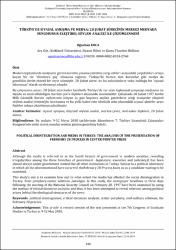| dc.contributor.author | Koca, Oğuzhan | |
| dc.date.accessioned | 2021-12-12T22:01:29Z | |
| dc.date.available | 2021-12-12T22:01:29Z | |
| dc.date.issued | 2019 | |
| dc.identifier.issn | 2146-3417 | |
| dc.identifier.issn | 2587-2052 | |
| dc.identifier.uri | https://dergipark.org.tr/tr/pub/klujfeas/issue/48895/561243 | |
| dc.identifier.uri | https://dergipark.org.tr/tr/download/article-file/813445 | |
| dc.identifier.uri | https://hdl.handle.net/20.500.11857/4160 | |
| dc.description | DergiPark: 561243 | en_US |
| dc.description | klujfeas | en_US |
| dc.description.abstract | Modern toplumlarda medyanın görevi devletin yasama-yürütme-yargı erkleri arasındaki çarpıklıkları ortaya koyan bir tür 'dördüncü güç' olmasına rağmen, Türkiye'de hemen tüm kurumlar gibi medya da genellikle devlet-eksenli bir seyir izlemiştir. 28 Şubat süreci de bu anlatılanların vuku bulduğu bir 'siyasal laboratuar' olarak incelenmeye adaydır.Bu çalışmanın amacı, 28 Şubat sürecinden hareketle Türkiye'de var olan toplumsal ayrışmayı medyanın ne ölçüde ve nasıl etkilediğini merkez-çevre ilişkileri ekseninde incelemektir. Çalışmada 28 Şubat 1997 tarihli Milli Güvenlik Kurulu toplantısını izleyen üç gün boyunca seçilen gazetelerin attığı manşetler eleştirel söylem analizi yöntemiyle incelenmiş ve bu yolla haberlerin ideolojik arka planındaki siyasal aktörler arası ilişkiler ortaya çıkarılmaya çalışılmıştır. | en_US |
| dc.description.abstract | Although the media is referred to as the fourth branch of government in modern societies, revealing irregularities among the three branches of government -legislature, executive and judiciary,it has been almost always under government control like all other institutions in Turkey. Similar to a political laboratory in which all the aforementioned have occurred, theFebruary 28 Process faces us as a candidate waiting to be examined. This study’s aim is to examine how and to what extent the media has affected the social disintegration in Turkey, from periphery-center relations paradigm. In this study, the newspaper headlines in three days following the meeting of the National Security Council on February 28, 1997 have been examined by using the method of critical discourse analysis; and thus, it has been attempted to reveal relations among political actors behind the ideological structures of the news. | en_US |
| dc.language.iso | tur | en_US |
| dc.publisher | Kırklareli Üniversitesi | en_US |
| dc.relation.ispartof | Kırklareli Üniversitesi İktisadi ve İdari Bilimler Fakültesi Dergisi | en_US |
| dc.rights | info:eu-repo/semantics/openAccess | en_US |
| dc.subject | siyasal ayrışma | en_US |
| dc.subject | medya ve siyaset | en_US |
| dc.subject | merkez-çevre ilişkileri | en_US |
| dc.subject | sivil-asker ilişkileri | en_US |
| dc.subject | 28 Şubat süreci | en_US |
| dc.subject | eleştirel söylem analizi | en_US |
| dc.subject | political disintegration | en_US |
| dc.subject | critical discourse analysis | en_US |
| dc.subject | center-periphery | en_US |
| dc.subject | civil-militaryrelations | en_US |
| dc.subject | the February 28 process | en_US |
| dc.title | Türkiye’de Siyasal Ayrışma ve Medya: 28 Şubat Sürecinin Merkez Medyada Sunumunun Eleştirel Söylem Analizi ile Çözümlenmesi | en_US |
| dc.title.alternative | Political Disintegration and Media in Turkey: The Analysis of the Presentation of February 28 Process in Center Printed Press | en_US |
| dc.type | article | |
| dc.department | Fakülteler, İktisadi ve İdari Bilimler Fakültesi, Siyaset Bilimi ve Kamu Yönetimi Bölümü | |
| dc.identifier.volume | 8 | en_US |
| dc.identifier.startpage | 144 | en_US |
| dc.identifier.issue | 2 | en_US |
| dc.identifier.endpage | 160 | en_US |
| dc.relation.publicationcategory | Makale - Ulusal Hakemli Dergi - Kurum Öğretim Elemanı | en_US |
| dc.institutionauthor | Koca, Oğuzhan | |



















